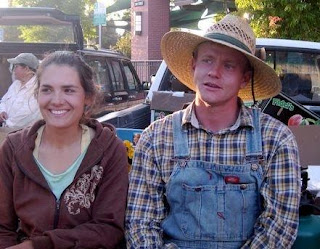
Reposting in full from Worldwatch blog Nourishing the Planet, 14 October 2009
'Matthew McCue’s memories of the time he spent in Iraq as a soldier are probably not what you would think. Along with the checkpoints, daily patrols, and desert heat, Matthew remembers vegetable gardens, carts brimming with watermelons, and local farmers. It is these vivid memories of Iraqi farmers and their produce that inspired his love of agriculture.
These days he lives in California and runs his own farm with his partner, Lily Schneider, in Suisun Valley. Growing food for local farmers’ markets and providing fresh produce for a more-than 90 member CSA (Community Supported Agriculture), Matthew has also become an advocate for connecting other veterans with farmers to form mutually beneficial partnerships.
“Watching people stare down the barrel of a gun with a cart full of produce because they are trying to get to the market to sell it to other members of the community got me thinking about agriculture in a way I hadn’t before,” said Matthew when I spoke to him on the phone the other day.
Matthew came home from Iraq and spent the next couple of years learning to farm. After serving with the Peace Corps in Niger, where he worked with a small community of farmers, Matthew came back to the United States, started his own small-scale, organic farm, and became an active member of a growing movement to rehabilitate returning Iraq and Afghanistan veterans struggling with Post Traumatic Stress Disorder through farming.
“To go from knocking down peoples’ doors and arresting them as a soldier to growing food and helping feed communities was a powerful experience for me. It can be hard to function as a veteran after existing in the context of a war, and learning farming skills can be a good way for soldiers to learn a new kind of job.”
Matthew is on the board of the Farmer-Veteran Coalition (FVC), an organization that helps place returning Iraq and Afghan veterans at small-scale organic farms where they can learn new skills while also making the often difficult transition back into civilian life.
“Overcoming the experience of wartime takes a lifetime,” said Matthew. “Working on a farm or receiving training for new skills helps ease that transition by allowing them to participate in the more pure, almost righteous, activity of farming.”
“Small-scale farmers are in trouble here in the United States,” said Nadia McCaffrey, founder of the McCaffrey Foundation and a board member of FVC, whose son Patrick was killed in Iraq in 2004. “Farmers and veterans working together is a perfect union because the veterans benefit from the training and the work, and the farmers benefit from the support and help on their farms.
The McCaffrey Foundation, which comprises small farms and veteran support groups around the country, has ambitious plans to create a large training farm in Minnesota, where veterans and their families will receive around-the-clock support in addition to training in farm skills.
“There is nothing more basic than producing food,” said Matthew. “Everyone buys vegetables and everyone who grows them eats them and sells them. It’s happening all over the world, even in the middle of war, and when you do it at our level it’s almost completely self-sustainable.”'
No comments:
Post a Comment
Please leave your comment here. Please note these stories are posted for information rather than for debate; if you wish to disagree with something posted, no problem, but since I post both things that I do and don't support, it would be appreciated if the criticism was about the issue.